#Дейран
Explore tagged Tumblr posts
Text
The Inconspicuous Writing Gem: Daeran’s Look-alike Contest Breakdown

The Dance of Masks brought the long-anticipated last hurrah to the Knight Commander’s story. Although it was announced that the DLC would focus on the companions, I wasn’t holding my breath for substantial content that would actually enrich the characters’ plots. The game is already massive and has a ton of variables, so expecting the writers to continue storylines that can have multiple outcomes would be unreasonable. But one scene far exceeded my expectations and set the bar high for the rest of the expansion, rendering me more critical about some of its elements than I would normally be. The event in question may not appear as much, but the true artistry in writing stories driven by the player’s choice fully reveals itself in what we don’t see on the surface. Daeran’s look-alike contest varies greatly, depending on how his personal quest was resolved, and, therefore, serves as a semi-epilogue to his arc. I wanted to post an analysis of his character’s progression for quite some time, and this send-off is a fitting opportunity to delve into this matter. I’ll break down the differences in the new scene as well as in a few others and share my overall thoughts on what this addition brings to the table. Brace yourself because it’s going to be long.
I'll start with a quick reminder of what Daeran’s questline outcomes are, because I'm going to reference them a lot:
Good, in which he’s openly grateful to the Knight Commander despite having to face the tribunal, and Liotr, noticing their bond, intervenes so the Inquisition doesn't lock him up;
Lobotomy, in which Daeran reluctantly accepts his predicament of having to face the trial, Liotr doesn't support him and after the crusade, the Count is sent to the asylum and lobotomized;
HappyEvil, in which the Commander kills Liotr to secure Daeran’s freedom;
ArchEvil, in which Daeran doesn't have any trust in the Commander, feels deserted and murders Liotr to avoid the trial.
At first glance, there's nothing profound about Daeran’s festival quest — it fits his image to indulge in the vain act of self-celebration by choosing the most accurate imitation of himself. However, this simple setup proves itself clever when we realize that, by observing the contestants, he sees himself in a distorting mirror. Coincidentally, each participant appears to represent a different facet of the Count’s character. Therefore, his reactions to them speak volumes of the self-image and mindset he developed during the crusade in each scenario.
Among the doubles, we have an aasimar who mimics Daeran's arrogance and cruelty, and constantly interrupts other participants' speeches with mocking remarks.
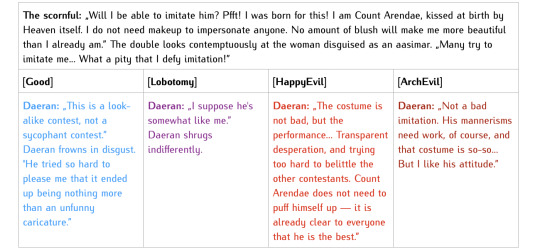
A woman who recreates Daeran's sophisticated bon vivant persona.

A drunkard who paints Daeran as a worthless and utterly unapologetic rake.

And finally, an innocent boy who keeps staring at Daeran with admiration and portrays him as a virtuous hero of the crusade.

After the presentation of the contestants is over, Daeran asks the Commander’s opinion. Again, his responses to their verdict vary in each case (unless they choose the cat), but the difference in how he reacts to being compared to the little boy is the most telling.
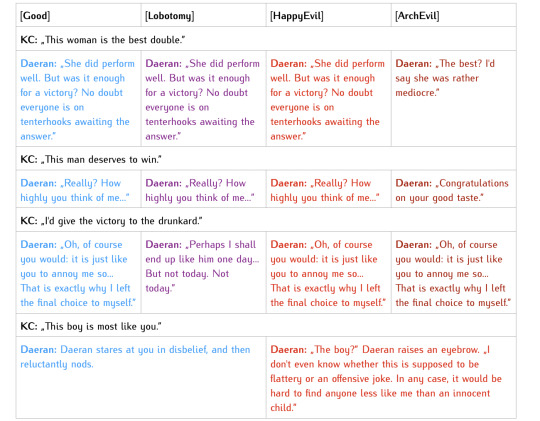
No matter what the protagonist suggests, the winner of the contest is fixed for each of the outcomes. If the Commander failed to earn Daeran's trust and he murdered Liotr himself, the conceited aasimar is declared the winner.

If the Commander killed Liotr, the Count awards the lady.

If the quest was resolved peacefully (either Good or Lobotomy), Daeran chooses the boy and has a heartwarming exchange with him.

This variety of possible scenarios and the way they are handled encapsulate why I consider Daeran's story so intricately woven and enjoyable to analyze. He's an incredibly flexible and dynamic character whose potential endings range from becoming a saint to a homicidal maniac. But what makes this duality and everything that comes in between so engaging is that all these vastly contradictory conclusions are equally organic and convincing, given his rich characterization and the player’s choices. The subtle yet significant divergences in the narrative paths maintain the integrity of his personality and prevent his evolution from seeming far-fetched while efficiently showcasing his growth or regression.
Regretfully, this attention to detail is missing from the other new scenes, which don't convey a similar sense of progression and can come off as somewhat disconnected from the rest of the playthrough. The rendezvous, for example, avoids references to how the player concluded Daeran's romance and quest. Given these plotlines' non-linearity, it's an understandable approach, but it prevents the scene from exploring deeper themes and hitting more emotional notes. What's particularly detrimental to the its overall intensity is the absence of exclusive dialogue for the True Love outcome. Ironically, it's the two worst endings that get unique and surprisingly heartfelt lines.
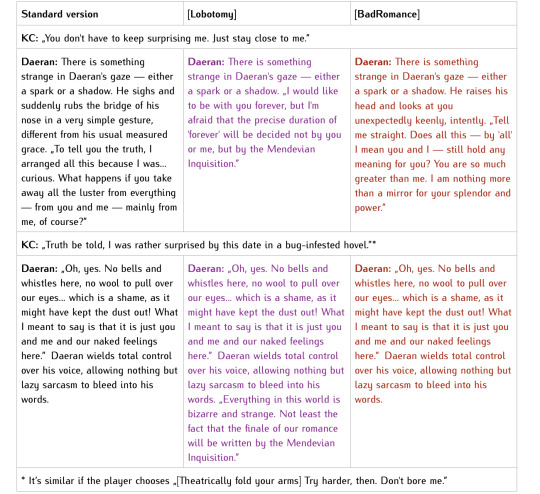
The difference is insignificant, however, because the conversation always plays out the same. All in all, the segment is nice and leaves a lot to the imagination, but only partially exploits its potential. Meanwhile, the festival mini-quest embraces the aforementioned strengths of the storyline's writing, giving every iteration of Daeran distinct dialogues that clearly demonstrate the impact the crusade and acquaintance with the Commander had on him.
I won't examine every dialogue branch in detail but will mainly focus on the Good scenario. As someone who likes this ending the best and even advocates the controversial writing in the final confrontation with Liotr, I always thought the narrative failed to properly sell its implied benefits. Apart from the closing conversation in the quest itself, late-game provides little reactivity to differentiate the outcomes, making it hard for the players to fully grasp the internal shift that Daeran undergoes. Comparison of said dialogue in various scenarios reveals his perspective in Good route as the least egocentric and overall most mature. Unfortunately, in an individual playthrough, these qualities can get overshadowed by the Count's dissatisfaction with the inconveniences he will eventually have to endure.

Aside from that, the effects of each resolution manifest only in Daeran's responses to one question in the romantic route and how he expressed his feelings regarding Galfrey’s death.
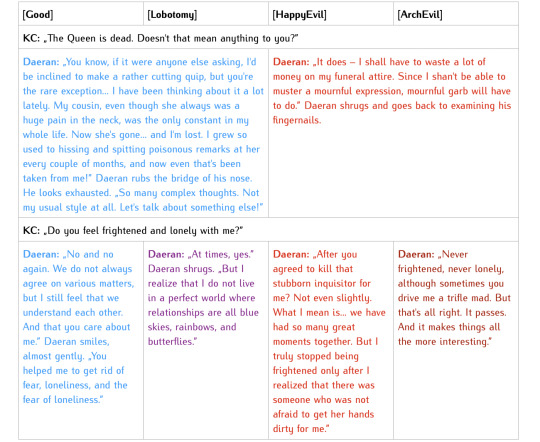
Even though they show evident contrast and serve as a much-needed emotional pay-off for the moral dilemma the player faced in the storyline finale, both are relatively minor, with the Queen one completely missable in most playthroughs. When combined with the similar omission of negative repercussions for Daeran’s moral condition and emotional maturity in other outcomes, it's not surprising many players believe he doesn’t ever change or that becoming better fundamentally clashes with his nature.
The discussed competition scene remedies the narrative’s deficiencies, ultimately proving this statement untrue. In the Good outcome, Daeran presents a reasonable dose of self-distance. When confronted with the drunk’s insults, he replies with humor and courtesy, which is a stark contrast to his reactions in the Evil outcomes and his past responses to criticism. Despite being hurt by the harsh judgment, he understands such a low opinion of himself is somewhat justified. The Count's mild response and his sensitivity to the suggestion that he's nothing more than an unfeeling scoundrel may even indicate that he has developed some remorse for his past actions. He also dismisses unwarranted flattery and distances himself from the brash egotism. All without falling into a spiral of gloom and self-deprecation that occurs in the Lobotomy scenario. Introspectiveness and vulnerability showcased here are a seamless continuation of the self-evaluation Daeran does in the High Trust version of his quest upon being supposedly betrayed by the Commander.
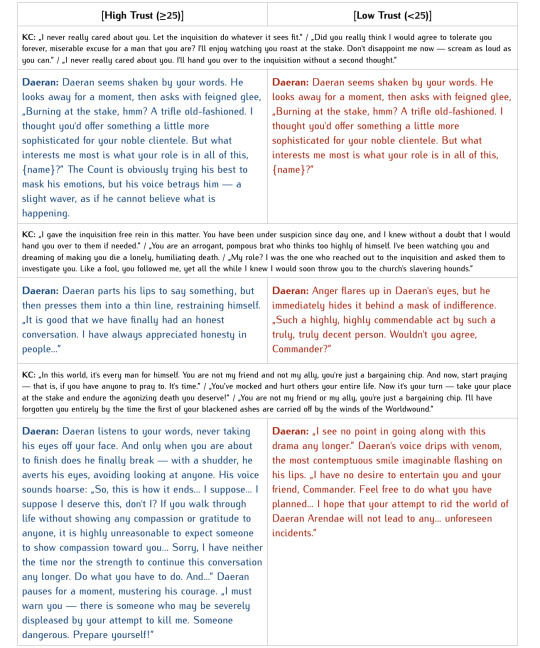
It's all the more unfortunate that the other interactions in the DLC don’t acknowledge these differences and instead return to the common denominator of all endings. As a result, the player will go from Daeran, who self-reflects and claims the aasimar presents an unfunny caricature of him, to Daeran in the tavern, who puffs himself up exactly like the guy (using even the same words) and seeks more sycophantic praise. While it's expected for him to put on an airy act and tease others, the absolute lack of self-awareness he previously exhibits in the Good route is quite jarring. Considering the complexity of the storyline as well as all sorts of limitations, such inconsistencies are inevitable (the base game already has a fair share of them) and in the end, one can easily reconcile them through their own interpretations. However, after being spoiled by a reactivity treat like the festival mini-quest, it's disappointing that the remaining dialogues lack similar nuance.
In the Good scenario, Daeran's behavior reinforces what we learn in the epilogue — that in this version, he has the most difficulty navigating through his newfound freedom and redefining himself in it. Choosing the winner of a silly contest shouldn't be hard for him, and it isn't in the Evil outcomes. There, the self-satisfied Count (who in both cases already has the blood of at least one innocent man on his hands) picks what he perceives as an idealized version of himself — be it the aestheticized depiction of his self-centredness or the unbridled and unyielding haughtiness. Noteworthily, in the Happy variant, Daeran openly flirts with the lady and, in both Evil paths, if not romanced, attempts to seduce his favored contestant. It’s peak narcissism, given the implications of the scene. In the peaceful outcomes, especially the Good one, the ordeal is a series of unpleasant self-reflections that even causes him to become overwhelmed by sorrow at one point. In the end, Daeran’s choice stems not from an ulterior motive or a desire to boost his ego but from genuine fondness for the boy. The youngster's belief in the Count’s kindness and heroism reminds him of his own innocence that was prematurely and brutally snatched from him. At his core, Daeran is not a self-sufficient master of his own fate but a helpless child thrown by unfortunate circumstances into otherworldly oppression and a vicious cycle of selfishness. In the Evil routes, he successfully deludes himself into believing he’s the former, but here, he realizes he’s the latter.
We're used to seeing Daeran scoffing at saccharine narratives and lofty ideals, and in the Evil versions, he's indeed annoyed with the boy’s portrayal of him. In one of them, he even anticipates him to be disenchanted, finding the prospect amusing. In the campaign's early stages, the Count voices his dissatisfaction with being enrolled in the crusade and laments the tarnishing of his ill reputation. Any suggestions that he may be secretly vulnerable are met with biting retorts. But now, Daeran doesn't disabuse the child and isn’t even bothered by being seen as a heroic figure. There also isn’t any objection when the Commander points out the similarity between him and the boy. He’s shocked they can see through him but decides to be honest and agrees with their assessment. Daeran’s sensitivity and his tendency to be more emotionally transparent with the protagonist is, at this point, a recurring theme in the peaceful outcomes, so it’s a shame that when they later choose to compliment his vulnerable soul, he's always equally dismissive.
Daeran is perfectly aware of how damaging cruel disillusionment can be to one’s psyche. As a child, he witnessed firsthand the powerlessness of good in the face of evil, the suffering adhering to moral principles can bring, and how those who claim to be righteous can turn out to be as callous and uncaring as hardened villains. These experiences left the young Count with a pessimistic view of the world and human nature, making him adopt coping mechanisms that only deepened his melancholy and loneliness. Knowing this, he wishes to spare the boy a similar fate and plays along to preserve his innocence.
In the non-peaceful outcomes, Daeran gives the signet away as if it was an insignificant bauble. But even though we barely ever see this side of him, some dialogues indicate he’s proud of his heritage and his ancestors' role in Mendev’s history. They were valiant defenders of the kingdom, who, for generations, protected its borders from any threat. This is who the Count, as a scion of the Arendae house, was originally destined to be and who, it so happens, the boy sees in him. Perhaps his take on him makes Daeran reflect on how differently things could have turned out had it not been for his family's demise and the Other’s interference. It undoubtedly revokes memories of his roots and deceased kin, since he not only rewards the child with the ring but also educates him on its meaning and sentimental value, expressing unexpected sincerity and kindness. In the Lobotomy scenario, this gesture is particularly bittersweet — with his impeding childless death, Daeran’s lineage is going to expire, making the memento the only way to keep its memory alive.
Finally, the Good version of the scene carries a deep symbolic significance. Daeran rewards one person who doesn't focus on his superficial traits or recreates the mask he hides behind. The image the boy paints of him may not be accurate, but while the other portrayals embody what the Count turned into under the Other's influence, this one shows what he could have been if he hadn’t lost the childish naivety he now longs for. And who he, despite his own skepticism, still can or perhaps even already started to become, thanks to the good protagonist's compassion and support. Just like the Commander, the boy views him as someone better than what his predicament forced him to be. And Daeran, confronted with sincere faith in him, cannot help but answer the call.
#pathfinder: wrath of the righteous#pathfinder wotr#pwotr#wotr#wrath of the righteous#owlcat games#daeran arendae#daeran#Дейран#my analysis
270 notes
·
View notes
Text
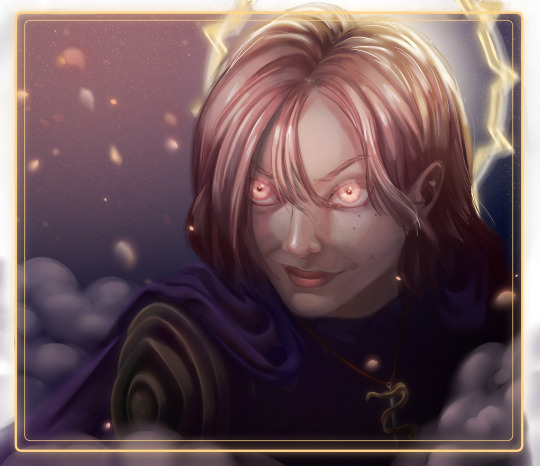


Hi! I passed Pathfinder 2! I don't know English well enough, and therefore I will write a post in Russian, I think that any online translator will be able to translate it for you. In this post I talk about the pros and cons of the game, about my impressions! I love this game very much! If you want to talk to me about Pathfinder, then write to me! Прошла #pathfinder wrath of the righteous и даже не на плохую концовку! На весьма обычную и вполне устраивающую меня. Потому вот вам небольшой обзор. Плюсы: ◈ Семейная атмосфера. Практически все англоязычные (про русскоязычных не знаю) отметили, что в пати семейные атмосферы, легко выделить кто в какой позиции и как заботится о других. Дейран если бы мог, то приютил бы Вольфжифа и Уголька, Грейбор также заботится об Угольке, Сиила защищает и так далее. ◈ Возможность гибко построить отношения с другими персонажами. Симпатия, любовь, ненависть, презрение, собутыльника, друзья и так далее. ◈ Реиграбельность. Можно пройти игру раз 14 и история будет достаточно отличаться, а вы, как минимум, при 7 прохождения будете узнавать новую информацию. ◈ Твисты. Помню, как в Драгонаге:Инквизиция все ждали какой-нибудь твист связанный с гг или ситуацией в мире, но его не произошло. Здесь же история другая, местный твист можно не ожидать при первом прохождении, хотя и один мифический путь проспойлерит его раньше того момента, которого надо ждать тому же Трикстеру. ◈ Графика лучше предыдущей части, но я её не видела, мой ноут не т��нет ◈ Местный юмор. Если хотите почувствовать себя, как дома, с атмосферой мемасных песен Канцлер Ги, то вам сюда. Оно не имеет излишек и потому не мешает, а лишь дополняет. ◈ Отношения с нпс. У вас есть шанс построить дружбу, симпатию и антипатию, а также уважение или наоборот и с нпс. Лично я была удивлена получившемуся раскладку в финале. Минусы или дискомфорт: ◈ В эту игру не поиграл Куплинов. А ведь местный юмор и его юмор дали бы прекрасное сочетание. ◈ Мифические и важные предметы никак не помечены и потому их, слегка говоря, легко продать и просрать этим самым полноценно хорошую концовку. Со мной так и произошло. Всё кроме них было хорошо. Проблему можно было бы решить дав хотя бы какую-нибудь сумку, чтобы класть в неё предметы и они были бы отдельно от остальных, если вовсе не заблочить их продажу. ◈ Нельзя пройти игру на наиболее хорошие концовки без режима армии и ставки командования. Я понимаю, что это одна из фишек серии игр, но я из-за этого дропнула прохождение первой игры и не сделала это со второй лишь из-за внезапной любви к ней. ◈ Рандомные лаги. Например, я не могу закончить игру, буквально не могу, потому что игра зависает на моменте после финала и вылетает. Эпилог я не видела в итоге. В патчах я так решение этой проблемы и не увидила. ◈ Часто бывает очень странная реакция на последствия мифического пути. Моя девочка - Трикстер, при этом она ведёт себя большую часть времени расчётливо и холодно (от неё после финала ушла Уголёк, потому что она не удовлетворил её просьбу, потому что это было рискованно). Но реакция на неё, как на королеву дурки и беспредельного балагура. Но ладно допустим предполагается, что стиль игры игрока при прохождении этого пути был бы именно такой. Выводы личные: Это моя любимая игра, не считая Драгонаги 2. Для меня они на одном месте. Я проходила игру долго, иногда так было из-за лагов или того, что некоторые вещи в игре не очевидны и требуют пиксельхантинга. Но в целом впечатления позитивные, даже очень, а негативные стороны игры мне впечатления не испортили. Особо порадовало, что всем кому хотела, жизнь я, в игре, попортила :D К пости приложен мой скетч вышедшего финала. Я не помню было ли там написано, что у Волфи помимо небольшого живота появилась ещё и растительность на лице, но я решила, что раз он взял трость, то и усы пусть будут. Это самая опасная семейка определённо. А у Зарии ещё и довольно крепкие хорошие отношения с Сокотбеннотом, Госпожа-в-Тенях к ней также относится позитивно, приятельство с богиней-феей и прочее. Скорее всего эти криминальные черти планируют чьё-то убийство здесь. Или ограбление.
#pathfinder#pathfinder wrath of the righteous#pathfinder wotr#daeran arendae#daeran#aasimar#oc#original character#digital art#game fan art#fan art
17 notes
·
View notes
Text

Daeran stands with one arm slung across his chest — he seems to be listening intently to something only he can hear.
Act 4 continues to be my favorite.
#pathfinder: wrath of the righteous#pathfinder wotr#pathfinder#pwotr#wotr#wrath of the righteous#owlcat games#daeran#daeran arendae#Дейран#my art#fanart
173 notes
·
View notes